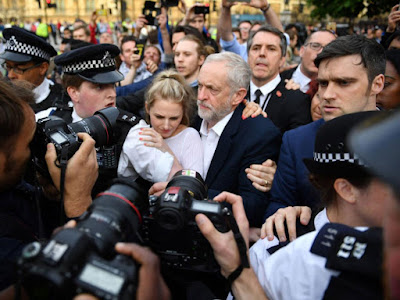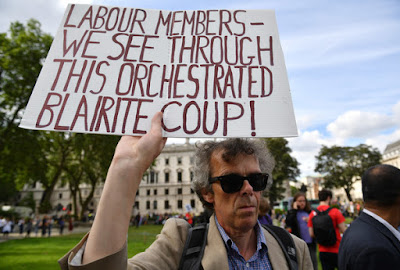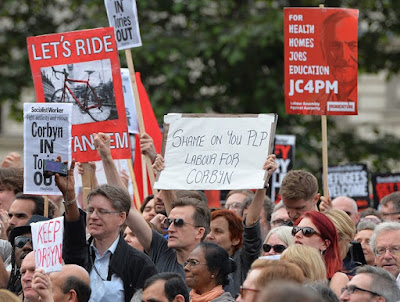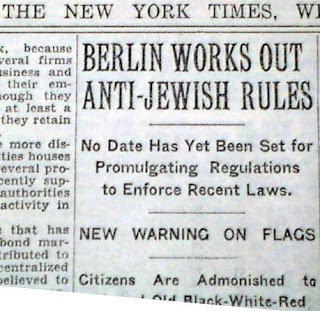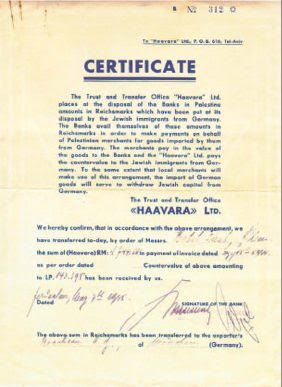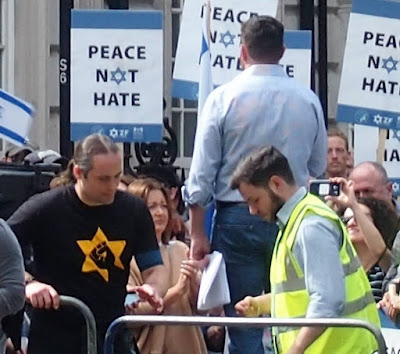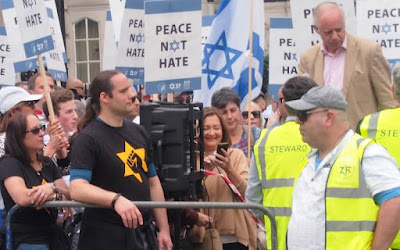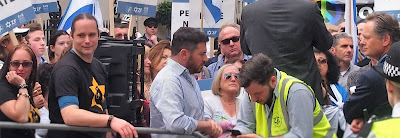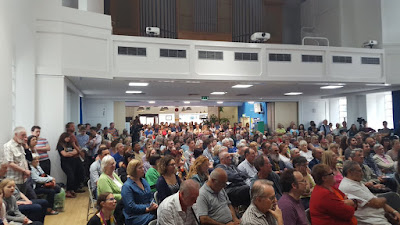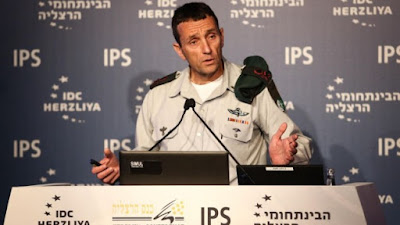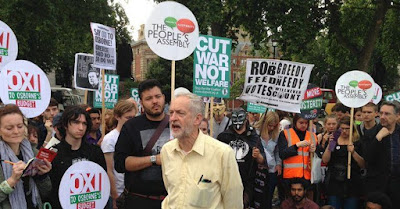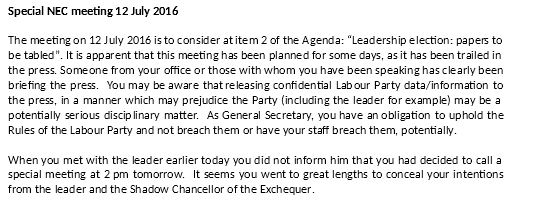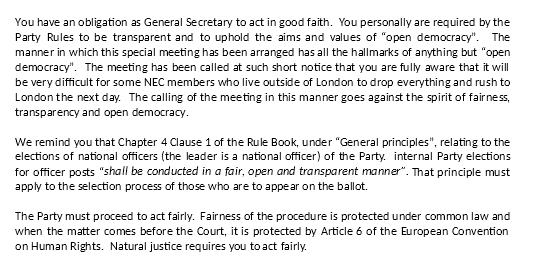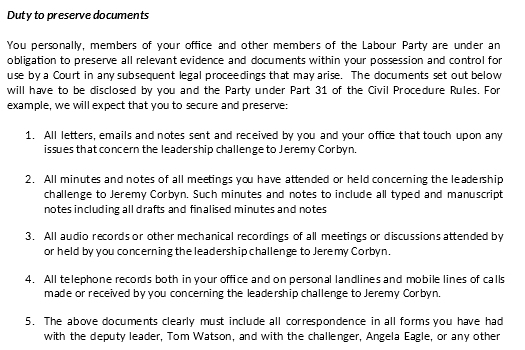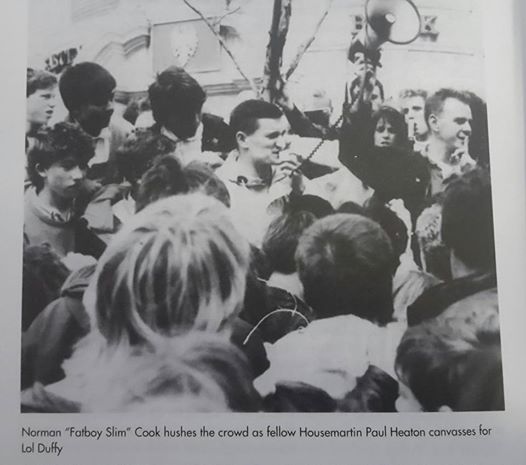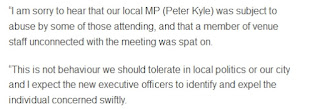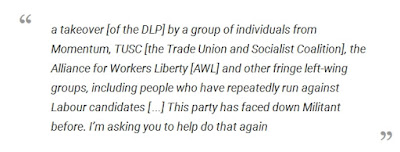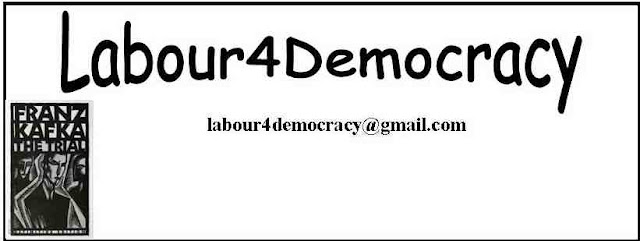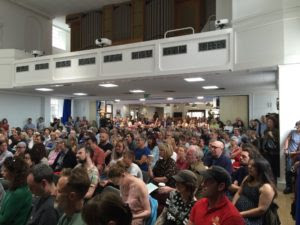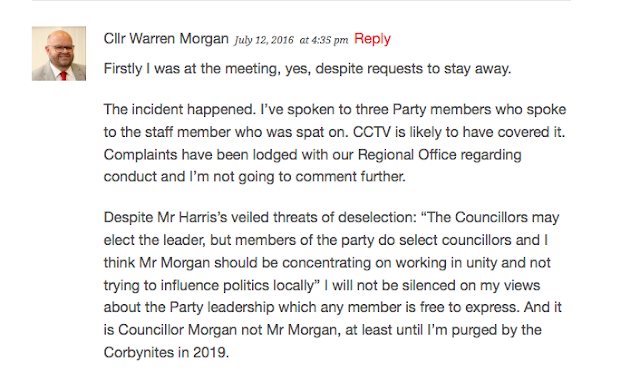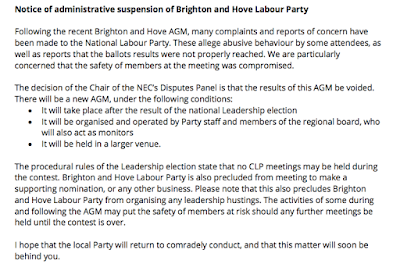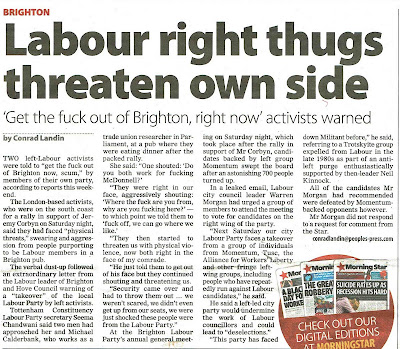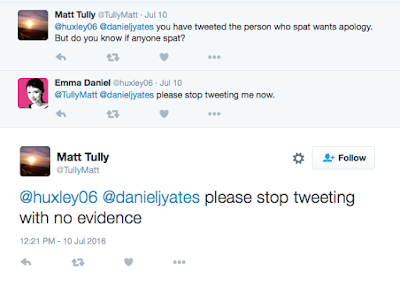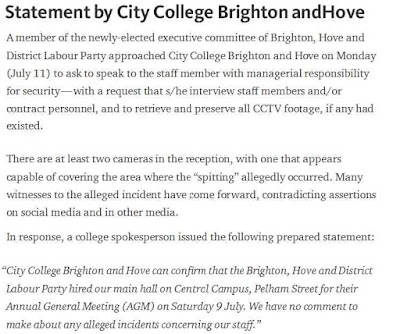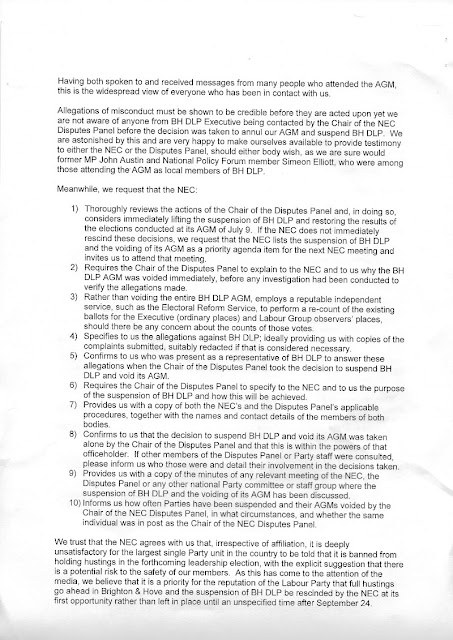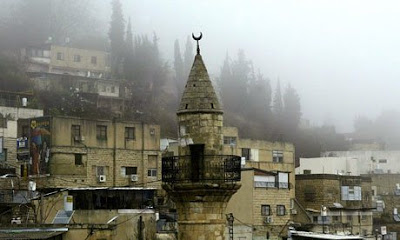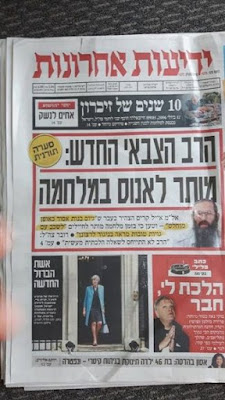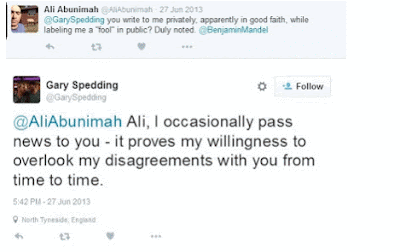![]() |
| After the head of the Gestapo's Jewish Desk - Baron von Mildenstein visited Jewish Palestine he wrote a series of 12 articles praising the Zionist settlement in Der Angriff Goebbel's paper |
fter Ken Livingstone stated that Hitler supported Zionism, there was an outbreak of synthetic outrage from the Zionists and rent-a-mouth MP John Mann. The result was Livingstone’s suspension from the Labour Party. One effect of Livingstone’s remarks was to make people curious about the record of the Zionist movement during the Nazi era. Because of the Zionists use and abuse the memory of the Jews murdered in the Holocaust to justify Israel’s racism, ethnic cleansing and murder of the Palestinians, people have naturally become interested in the actual Zionist record in the 1930’s and 1940’s. ![]() |
Ken Livingstone - Suspended for Telling the Truth
The Israeli propaganda organisation, BICOMfelt it necessary to publish an article in its on-line magazine Fathomattempting to rebut Livingstone’s allegations. Instead of a reputable holocaust historian, Fathom’s far-right editor, Prof.Alan Johnson, chose Paul Bogdanor, a hasbarist who makes Senator Joe McCarthy seem dangerously subversive. Bogdanor is a pathological anti-communist who publishes red baiting articles like Chomsky’s 200 liesand Tony Greenstein and the Nazi Apologists |
![]()
Behind Bogdanor’s bluster about me being in a “state of panic”, one thing is clear. Bogdanor is unable to even understand, still less defend, the critique of the Zionists’ record during the holocaust. That is why the decision of Fathom to employ a propagandist is at first sight puzzling. However Johnson’s decision makes sense precisely because the last thing that the Zionists want is a debate over the Zionists’ prioritisation of building a ‘Jewish’ state over rescuing Jews during the Holocaust.
![]() |
| Judische Rundschau the Zionist paper carried the slogan 'Wear the Yellow Start with Pride' |
Bogdanor’s writing is reminiscent of the vitriol employed against Hannah Arendt, herself a Jewish refugee from Nazism and Ben Hecht. Hecht was a Revisionist Zionist who was so appalled by Zionist collaboration with the Nazis in Hungary and the indifference of American Zionists to the Rescue of Jews, that he wrote a devastating book ‘Perfidy’ about Israel’s Kasztner’s trial. Arendt’s Eichmann in Jerusalem – the Banality of Evil was based on a series of 5 articles in the New Yorker. The book touched on subjects such as the relationship between the Zionist movement and the Nazis in Hungary, the record of Kasztner, the leader of Hungarian Zionism and the Jewish leadership under Nazi occupation, which the Eichmann trial had studiously avoided. … the campaign, conducted with all the well-known means of image-making and opinion-manipulation, got much more attention than the controversy…. (it was) as though the pieces written against the book (and more frequently against its author) came “out of a mimeographing machine” (Mary McCarthy)… the clamor centered on the “image” of a book which was never written, and touched upon subjects that often had not only not been mentioned by me but had never occurred to me before.”
Shooting the messenger has always been the Zionist modus operandi. Apparently Arendt had claimed that ‘the Jews had murdered themselves.’ Why had she told ‘such a monstrously implausible lie? Out of “self-hatred” of course.’ Marek Edelman, the commander of the Jewish Fighting Organisation in Warsaw, ZOB, was not invited to testify at the Eichmann trial because he was not a Zionist. He had been a member of the anti-Zionist Bund, which had led the resistance. Likewise Rudolf Vrba, the Jewish escapee from Auschwitz, whose Auschwitz Protocols had helped save 200,000 Hungarian Jews, was also not invited to testify because he too was not a Zionist. As Ruth Linn, a Professor at Haifa University, explained ‘More than 35 years later… a prominent Israeli Holocaust historian explained to me that “Vrba was probably not invited since the State of Israel had no money to sponsor the flight.’ even though witnesses from further afield had their fares paid.Even Andrew Biss, the friend of Rudolf Kasztner, the former head of Va'ada, the Zionist Rescue & Relief Committee in Budapest, was not invited to testify, because he intended to defend Kasztner. Those stage managing the Eichmann trial were determined to keep the Kasztner saga out of the courtroom.
Bogdanor’s accusation that I deny ‘Irving style that Zionists were victims in the Nazi concentration camps.’ is a good example of his style and method. Of course I said no such thing. What I did say was that after the arrest of thousands of Jews in the wake of the Kristallnacht pogrom (November 9-10 1938), the Nazis very quickly released Jews who were Zionists. As Israeli historian, Tom Segev wrote: “In Berlin and in Vienna, the SD ordered the release from jail of all Jews arrested during the Kristallnacht pogrom who were in any way connected with the Palastinaamt.’
Of course when it came to murdering Jews, the Nazis didn’t distinguish between Zionist, non-Zionist or anti-Zionist Jews, religious or secular. That is why the efforts of the Zionist movement to present itself as a movement that the Nazis could work with was so pathetic. When the Holocaust began, in June 1941, in the wake of the invasion of the Soviet Union, Operation Barbarossa, all Jews in the conquered Russian territories were targets of the Einsatzgruppen death squads. However that doesn’t absolve the Zionist movement from accusations of collaboration.
Zionist acceptance of Nazi ideas of racial separation reached ludicrous heights when Robert Weltsch’s editorial in the German Zionist Federation [ZVfD] paper came out with the headline ‘Wear it With Pride, the Yellow Badge’ on 4th April 1933, eight years before the yellow star became compulsory.
Bogdanor’s response is illustrative of his method. If you mention that the Zionists were given more favourable treatment than non-Zionists before the holocaust began, this immediately becomes an allegation that no Zionists died in the extermination camps. Despite his anti-Stalinism Bogdanor is a polished performer of their dark arts.
![]() |
| NYT reports introduction of the Nuremburg Laws |
Background to Zionist Collaboration with the Nazis
The behaviour of the Zionist movement during the Nazi period was neither exceptional nor an aberration. From its inception the Zionist movement differed from all other Jewish reactions to anti-Semitism. Zionism accepted that the Jews were strangers in other people’s lands. Leo Pinsker, founder of the Lovers of Zion, held that ‘Judaephobia is then a mental disease, and as a mental disease it is hereditary, and having been inherited for 2,000 years, it is incurable.’ If anti-Semitism was incurable, there was no point combating it. Chaim Weizmann, the longest serving President of the Zionist Organisation and first President of the Israeli state wrote, ‘Whenever the quantity of Jews in any country reaches the saturation point, that country reacts against them….The determining factor in this matter is not the solubility of the Jews but the solvent power of the country. England had reached the point when she could or would absorb so many Jews and no more…. The reaction against this [Jewish immigration] cannot be looked upon as anti-Semitism in the ordinary or vulgar sense of that word.’ For Zionism anti-Semitism was a natural phenomenon and its cause was the Jews themselves. Weizmann wrote of Sir William Evans-Gordon, the founder of the anti-Semitic British Brothers League, that he had no particular anti-Semitic prejudices. He acted, as he thought, according to his best lights and in the most kindly way, in the interests of his country…. he was sincerely ready to encourage any settlement of Jews almost anywhere in the British Empire, but he failed to see why the ghettos of London or Leeds or Whitechapel should be made into a branch of the ghettos of Warsaw and Pinsk.’ Theodor Herzl, the founder of Political Zionism, remarked that wherever the Jews went they would ‘either introduce Anti-Semitism where it does not exist or intensify it where it does.’ Zionism hated Emancipation, because it led to assimilation. ‘where Anti-Semitism prevails it does so as a result of the emancipation of the Jews.’ Herzl accepted that ‘It might more reasonably be objected that I am giving a handle to Anti-Semitism when I say we are a people - one people;. It was an anti-Semitic trope that the Jews formed a nation separate from those amongst whom they lived. Acceptance of what the anti-Semites about Jews was widespread in the Zionist movement. Herzl observed that ‘When we sink, we become a revolutionary proletariat… and at the same time, when we rise, there rises also our terrible power of the purse.’ It is little wonder that Zionism saw anti-Semitism as its partner. ‘Great exertions will hardly be necessary to spur on the movement. Anti-Semites provide the requisite impetus. They need only do what they did before, and then they will create a desire to emigrate where it did not previously exist.’’ Herzl visited the rulers of Europe promising that the Zionist movement would help rid them of their unwanted Jews. In August 1903, in the wake of the Kishinev pogroms in April, which had killed 49 Jews and injured hundreds,he travelled to Russia to meet the author of the pogroms, Interior Minister Count von Plehve. Herzl outlined his vision of a Jewish state, which he hoped would be sponsored by the Czar. He offered to rid Russia of its Jewswho, he pointed out, were feeding the growing revolutionary movements. Plehve was all in favour, and when Herzl tried to convince him of the merits of Zionism, he interrupted him saying ‘You don’t have to justify the movement to me Vous prechez a un converti’ [You are preaching to a convert].’ The result of this meeting was that alone of Jewish political movements, the Russian Zionist movement was legalised. Plehve wrote a letter pledging “moral and material assistance” aletter which became “Herzl's most cherished asset.” Herzl told Von Plehve: “Help us faster to land and the revolt will end. So will the defection to the socialist ranks.” Herzl boasted that Zionism would dissolve all revolutionary socialist elements among the Jews. As Lacquer noted: “Herzl's critics maintained... that he made, a deal with Plehve promising that Jewish Socialists would no longer attack the tsarist government…” The attitude of the Zionist movement to the Nazis was no different from its historic attitude to anti-Semitism. Alone amongst Jewish political movements it welcomed the ascent of the Nazis. Zionism felt vindicated. Hadn’t it warned that anti-Semitism would triumph? The Zionist movement rushed to collaborate with the new Nazi government even whilst world Jewry understood that the Nazis and fascist anti-Semitism was different from anything that had gone before. Whereas world Jewry began a Boycott of Nazi Germany, the Zionists sought to work with the Nazi government to its best advantage. When Goering summoned the leaders of German Jewry to a meeting on March 25th 1933 to get them to have a massive Boycott rally in the USA called off, the ZVfD’s Secretary Kurt Blumenfeld, alone amongst the representatives, eagerly promised to co-operate with the Nazis in fighting the Boycott.
Blumenfeld stepped forward on behalf of the Zionists, declaring that the German Zionist Federation was uniquely capable of conferring with Jewish leaders in other countries… Once uttered, the words forever changed the relationship between the Nazis and the Zionists. ‘
Berl Katznelson, a founder of Mapai and editor of Labour Zionism’s daily paper, Davar, saw the rise of Hitler as “an opportunity to build and flourish like none we have ever had or ever will have”. Ben-Gurion hoped the Nazi victory would become ‘a fertile force for Zionism.’ I will first recall the points I made in response to Bogdanor’s original articlewhich he fails to respond to at all. Anything which Bogdanor found inconvenient to the narrative of a heroic Zionist movement was consigned to a historical black hole. Parts of My Response which Bogdanor ‘Forgot’ to Mention
1. I gave examples of how the Zionist movement never hesitates to use the Holocaust in its ideological wars against its opponents, despite their own Working Definition on Anti-Semitism holding that ‘Drawing comparisons of contemporary Israeli policy to that of the Nazis’ is anti-Semitic. Examples of the Zionist use of the Holocaust included dressing up ex-Prime Minister Yitzhak Rabin in Nazi uniform, Abba Eban’s referring to the 1948 armistice lines (the Green Line) as Israel’s ‘Auschwitz border’, Menachem Begin comparing Yasir Arafat in Beirut to Hitler in his bunker and Netanyahu’s attempt to lay the blame for the Holocaust on the Mufti of Jerusalem rather than Hitler.
2. I explained how historically Zionism had always seen anti-Semitism as having something of the ‘divine will to good’ in it. I cited Theodor Herzl as saying, in the middle of the Dreyfuss Affair how‘In Paris..., I achieved a freer attitude towards anti-Semitism, which I now began to understand historically and to pardon. Above all, recognise the emptiness and futility of trying to 'combat' anti-Semitism.’ I noted that Zionism’s attitude to anti-Semitism was that it was a completely normal, rational reaction by non-Jews to the abnormal, perverse presence of the Jewish stranger in their midst. In the words of Jacob Klatzkin, editor of the Zionist Organisation’s Die Welt (1909-11) and co-founder of Encyclopedia Judaica: If we do not admit the rightfulness of anti-Semitism we deny the rightfulness of our own nationalism... Instead of establishing societies for defence against the anti-Semites who want to reduce our rights, we should establish societies for defence against our friends, who desire to defend our rights. Bogdanor saw fit not to comment!
3. I explained how Bogdanor’s article ‘Tony Greenstein and the Nazi Apologists’ where he states that I ‘defend(s) communist collaboration with the Nazis but denounce(s) Zionists as joint perpetrators of the Holocaust.’ was a lie twice over. Bogdanor doesn’t attempt to defend his lies but he does complain of the ‘tone’ of my reply.
4. I gave examples of Bogdanor’s dishonest and error strewn description of the ‘anti-Semitism’ hysteria in the Labour Party. Bogdanor referred to Vicky Kirby’s tweets about ‘big (Jewish) noses’ as examples of this anti-Semitism. I showed how these tweets were from the 2010 comedy filmThe Infidel. I gave as further proof the fact that the film’s writer David Baddiel is Jewish. Bogdanor chose not to respond.
5. Jackie Walker, who has now been reinstated, was accused by Bogdanor of having said that ‘the Jews were behind the slave trade’. This was a malicious lie. Jackie said no such thing. Bogdanor again chose not to comment.
![]() |
| Frontpage.com - the racist Islamaphobic site to which Bogdanor contributes as a columnist |
6. Bogdanor said that Lenni Brenner’s book Zionism in the Age of the Dictatorswas a favourite amongst those who believe that ‘Zionists’ are to blame for all evil in the world. I suggested that this was a McCarthyite guilt by association. Bogdanor however took exception to me pointing out that he wrote several articles for the racist anti-Islamic Frontpage.com and its Jihad Watch offshoot. Bogdanor’s response was ‘I have never contributed to this site’, it ‘merely re-posted three articles’ which Bogdanor had published elsewhere. Frontpage.comhowever describes him as a columnist. Even if Frontpage.com merely reprinted his articles, Bogdanor is a racist Islamaphobe according to his own logic! David Horowitz who runs Frontpage.com, wrote a book to which Bogdanor contributed.
7. I pointed out that the attribution to Brenner of the belief that the Zionists had caused the collapse of the Weimar Republic was absurd and lacked any source. Bogdanor’s response is that silence is the better part of valour!
8. I took Bogdanor to task for his lie that the far left and those who allege Nazi-Zionist collaboration were accusing the Zionist movement of ‘perpetrating the Holocaust in collaboration with the Nazis’. This is yet another lie. Bogdanor cannot provide any quote to substantiate his allegation.
9. I pointed out that those who alleged Nazi-Zionist collaboration in the Kasztner trial in Israel weren’t far leftist apologists for Hitler but survivors of the Hungarian holocaust. Again Bogdanor prefers to hold his tongue.
10. I explained to Bogdanor how the dissident Zionists Merlin and Bergson of the Emergency Committee to Save the Jews of Europe had, in the face of the resistance of US Zionists Nahum Goldmann and Stephen Wise, successfully pushed the Roosevelt Administration to set up the War Refugee Board which had saved between 100,000 and 200,000 Jews. ‘What about Palestine’ was Wise’s response before the Senate when a Rescue Bill was proposed. Wise was wrong footed when asked if he was prepared to jeopardize saving Jews for the sake of Palestine. In a memo of a conversation between John Pehle of the War Refugee Board and Wise, the latter had said he considered Bergson as equally as great an enemy of the Jews as Hitler and threatened that the Jewish community would not support the WRB if it didn’t disavow Bergson and his committee. Again Bogdanor chose not to comment. ![]() |
| Ha'avara broke the Jewish Boycott of Nazi Germany |
11. I quoted from a Review by Elie Wiesel of Tom Segev’s pioneering book, The Seventh Million, on Zionism’s record during the Holocaust. Wiesel is an ardent Zionist who has never hesitated to attack the Palestinians and who is a flag bearer for the idea that the Holocaust is unique and not to be compared with any other act of genocide. Yet because Wiesel is an Auschwitz survivor, he is a bitter critic of some aspects of Zionist collaboration and indifference to the Jewish victims of the Holocaust. He said of Ha'avara, the Transfer agreement negotiated between Nazi Germany, that
‘There developed a growing perception that instead of supporting and strengthening the boycott, Palestine was, in fact, sabotaging it.’
Wiesel described how Itzhak Gruenbaum, Chairman of the Jewish Agency’s Rescue Committee, ‘considered creating new settlements more urgent than saving Jews from being sent to Treblinka and Birkenau.’ Wiesel described how ‘There were dramatic rescue operations such as the flight across the Pyrenees from France to Spain and the convoys of Jews that sailed from Denmark to Sweden. Only a few survivors owed their lives to the efforts of the Zionist movement." What was Bogdanor’s response? Nothing, not a word.
12. The evidence concerning Ha'avara, is clear. ‘The Ha'avara agreement would in the end shore up the Jewish Agency – then almost bankrupt – and grant it renewed momentum’ which is why ‘two months after Hitler came to power the Jewish Agency executive in Jerusalem had sent a telegram straight to the Fuhrer in Berlin, assuring him that the Yishuv had not declared a boycott against his country.’
‘The leaders of Germany realized that the anti-Hitler boycott was threatening to kill the Third Reich in its infancy, either through utter bankruptcy or by promoting an imminent invasion of Germany…’
Bogdanor’s response was to say that Ha’avara
was the subject of acrimonious debate within the Zionist movement as well as within world Jewry. My own opinion is that its critics were right and that it was naive to conclude any agreement with the Nazis. But the arrangement did save thousands of German Jews, as well as a fraction of German Jewry’s assets, from the clutches of the Nazis. Contrary to Greenstein, the boycott of Germany did not save anyone.
Bogdanor can’t quite bring himself to defend Ha'avara but he makes the best possible case for it. The Boycott led to the Nazis clamping down on anti-Jewish violence and to calling off the April 1st siege of Jewish shops after one day. The Boycott had a chance of toppling Hitler when he was weak. 20,000 German Jews used Ha'avara’s provisions to emigrate to Palestine but they were rich Jews who would have found little difficulty in emigrating to other destinations. Ha'avara gave the Nazi government breathing space with which to consolidate.
Black wrote that:
The leaders of Germany realized that the anti-Hitler boycott was threatening to kill the Third Reich in its infancy, either through utter bankruptcy or by promoting an imminent invasion of Germany…’
What was Bogdanor’s response? There wasn’t one.
13. I cited the fact that the ZVfD had lobbied the Nazi government to ensure that Jewish emigrants went only to Palestine and the fact that the Gestapo reciprocated doing “everything in those days to promote emigration, particularly to Palestine.” What was Bogdanor’s response? Nothing.
14. I quoted an article by Joachim Doron which stated that
It cannot be denied that the Jewish self-criticism so widespread among the German Zionist intelligentsia often seemed dangerously similar to the plaints of the German anti-Semites. The Zionists were keenly aware of this problem but they were not deterred by it.
I also cited the letter of Kurt Blumenfeld of the ZVfD to Germany’s Foreign Minister Walter Rathenau, who was assassinated in 1922, saying that ‘Under no circumstance does a Jew have the right to represent the affairs of another people.’ What was Bogdanor’s response? Nothing. 15. Bogdanor failed to comment on my response to his attempt to gloss over what Joachim Prinz, another prominent German Zionist leader had said about the Zionists being the favourite children of the Nazis. Brenner quoted Prinz:
‘Everyone in Germany knew that only the Zionists could responsibly represent the Jews in dealing with the Nazi government. We all felt sure that one day the government would arrange a round table conference with the Jews… there was no country in the world which tried to solve the Jewish problem as seriously as did Germany… It was our Zionist dream!… Dissimilation? It was our own appeal!…’ [39]
Bogdanor believes that Prinz’s complaints that the Zionists were ‘miserably treated’, and not very politely at that, cancels out the above.
16. Bogdanor argued that Ben-Gurion engaged in a secret rescue campaign based in Turkey, a campaign so secret that no one apart from Ben-Gurion’s archivist at Ben-Gurion University in the Negev knew or heard of it.
17. I cited two Zionist historians – Noah Lucas and Christopher Sykes – who like many other historians concluded that the Zionist movement intended to use the Holocaust to secure political advantages in terms of building their state. Even Ben-Gurion’s own, official biographer, Shabtai Teveth concluded that :
‘Ben-Gurion did not put the rescue effort above Zionist politics and he did not regard it as a principal task demanding his personal leadership; he never saw fit to explain why, then or later.’ .
Bogdanor chose not to comment when I cited Teveth’s conclusion that ‘‘‘If there was a line in Ben-Gurion’s mind between the beneficial disaster and an all-destroying catastrophe, it must have been a very fine one.’
18. One might have expected Bogdanor to have at least attempted to explain why the Palestinian press, in addition to denying or minimising the holocaust, went to the lengths of quoting from Nazi papers to the effect that there was no holocaust. I cited Shabtai Beit-Zvi on how
On March 23, 1943, Davar was reprimanded by Yosef Gravitzky, the managing editor of the Jewish Agency’s Palcor news agency, for copying from a Nazi paper, Ostland, a “report” that two million Jews remained in Poland, after the paper had reported one day earlier, on the same page, that no more than two hundred thousand Jews were still alive in all of Poland.[41]
Porter notes how ‘the Jewish press in Palestine treated the extermination of Hungarian Jews with silence’.
Davar and the Zionist press were not alone. Berl Katznelson’s ‘silence concerning the Holocaust was almost complete, his biographer noted.’ The agenda of the May 1943 meeting of the Histadrut Executive Committee listed ‘rescue efforts’ as 6th of 8 items on the agenda. Dead Sea developments and May Day celebrations took priority. At the Mapai meeting of December 1938, shortly after Kristallnacht, Ben-Gurion confessed that ‘In these terrible days of the beginning of the disaster that threatens European Jewry, I am still more worried about the elections at the (Mapai) branch in Tel-Aviv.’
Bogdanor chose not to comment on the above or the copious evidence of Shabtai Beit Zvi that the Zionist press chose to downplay the holocaust.
119. Bogdanor prefers not to comment on the fact that Rudolf Kasztner, in his capacity of representative of the Jewish Agency in Palestine and the World Jewish Congress, in the name of both organisations, exonerated and provided favourable testimony for 7 leading Nazis, including Hermann Krumey and Dieter Wisliceny, the butchers of Polish, Slovakian and Hungarian Jewry. I can only assume that Bogdanor choses not to comment because it is impossible to defend Kasztner’s behaviour. Since Bogdanor’s first loyalty is to Zionism, not to Jews, he prefers to remain silent.
Bogdanor’s Other Half Truths and Deceptions
Rescue Only to Palestine
According to Bogdanor it is a‘blatant falsehood that the Zionists opposed saving Jews unless they went to Palestine.’
Bogdanor dismisses all evidence to the contrary. The letter from Rabbi Solomon Schonfeld is dismissed as ‘a letter in the press from an anti-Zionist rabbi.’ Schonfeld, was Chairman of the Chief Rabbi’s Rescue Committee. He was appointed by the Chief Rabbi Joseph Hertz, who was a Zionist. To Bogdanor the mere fact of being an anti-Zionist is enough to dismiss his letter. Who was this ‘anti-Zionist rabbi’? According to Wikipedia:
‘Schonfeld personally rescued thousands of Jews. He was a very charismatic, dedicated, innovative and dynamic young man. His rescue efforts were inspired by his teacher at the Nitra Yeshiva, Rabbi Michael Ber Weissmandel. This explains, in part, some of his daring and innovative rescue style. His rescue activities were under auspices of the Chief Rabbi’s Religious Emergency Council, which he created with approval of Chief RabbiJoseph H. Hertz, his father-in-law.’
Rabbi Schonfeld wrote regarding a Parliamentary resolution calling for the rescuing of Jewish refugees from Nazi Germany that ‘
At the Parliamentary meeting held on January 27, 1943, …. a spokesman for the Zionists announced that the Jews would oppose the motion on the grounds of its omitting to refer to Palestine. Some voices were raised in support of the Zionist view, there was considerable debate, and thereafter the motion was dead. Even the promoters exclaimed in desperation: If the Jews cannot agree among themselves, how can we help?’
Most decent people would condemn this policy of the Zionists, which is confirmed even by historians. Bogdanor however cannot tolerate any criticism of the Zionist policy which preferred that if Palestine could not receive the refugees then no one should. Bogdanor cannot explain why Schonfeld should falsely allege the sabotage of a rescue initiative by the Zionists other than that he was an anti-Zionist.
Bogdanor refers to a letter published 2 days later in The Times that mentions a Zionist programme for refugees which was composed merely as a historical alibi. Words are cheap, but the actions of the Zionist movement in 1943 in opposing emigration to anywhere but Palestine were what counted.
Similarly Bogdanor cites a statement from Ben-Gurion that called for the rescue of Jewish children regardless of the destination. However when concrete initiatives such as the Evian conference arose, the Zionists opposed such initiatives.
According to Bogdanor I ‘repeat(s) the blatant falsehood that the Zionists opposed saving Jews unless they went to Palestine.’ Yet he fails to refer to Ben-Gurion’s comment regarding the Kindertransport which saved 10,000 German Jewish children.
If I knew that it would be possible to save all the children in Germany by bringing them over to England, and only half of them by transporting them to Eretz Yisrael, then I would opt for the second alternative. For we must weigh not only the life of these children, but also the history of the People of Israel.
In this one statement Ben-Gurion summed up the Zionist policy towards Rescue.
The only time that the Jewish Agency spent money on rescue was when it brought prestige to the Zionist movement: ‘The fact that the Jews of Palestine stand at the fore of a rescue front is an important Zionist asset.’ In October 1944, when Auschwitz was on the verge of finishing its murderous work, Ben-Gurion asked Chaim Barlas, who had just come from Istanbul, ‘Do they know there that the help comes from Palestine?’ This money however was only for those who could come to Palestine. Ben-Gurion ‘laid down the guidelines that JAE funds be used only for rescue by immigration to Palestine, whereas rescue by assisting Jews to survive elsewhere was to be funded solely by private and organizational donations.’
Building the Jewish State takes priority over Rescue
Bogdanor doesn’t comment on Ben-Gurion’s statement that ‘the disaster facing European Jewry is not directly my business….Although I was then chairman of the Jewish Agency executive, the enlistment of the Jewish people in the demand for a Jewish state was at the center of my activity.’
Bogdanor puts forward the preposterous theory citing Tuvia Friling that ‘Gruenbaum’s committee was never meant to be anything but a political lightning rod’ and that ‘the real Zionist rescue work was assigned to the Zionist network in Turkey, since (in Ben-Gurion’s view) it had to be done covertly.’
It is strange that no one else seems to have heard of this rescue work. The rescue work in Turkey concerned Aliyah Bet, the secret Zionist immigration to Palestine - nothing more. At most it saved 6,000 Zionist activists. If the Zionist movement had been serious about rescue work it would have established bases in Spain/Portugal and Sweden, which were nearer to the Jewish communities facing extermination.
It took until February 1943 before the Jewish Agency financed a trip by Shlomo Adler–Rudely to Sweden, a key neutral country adjacent to Norway, Denmark and the Baltic Republics. In the short time he was there, before the Jewish Agency cut the finance, useful work was done prior to the evacuation of the Danish Jewish community to Sweden. In Portugal in April 1943 there was a half-hearted sending of an emissary, Wilfrid Israel to coordinate and expand rescue work. When he was killed in June it took a further 3 months to send Fritz Lichtenstein. The Iberian Peninsula was a crucial destination for thousands of French Jews who travelled with the Armee Juif over the Pyrenees yet it took until April 1944 before the Jewish Agency established an office in the Iberian Peninsula. Dina Porat commented that ‘Istanbul was made the centre of the Yishuv’s rescue operations in the neutral countries. Was this because its location facilitated rescue operations and the extension of help, or because it could serve as an immigration route to Palestine? In other words was the primary consideration rescue or Zionism?’
Shabtai Beit Zvi, who Bogdanor cites when it is convenient, noted how, in almost all his speeches, Ben-Gurion ‘speaks about the prospects the Holocaust may open up for Zionism.’ Ben-Gurion in 1941 stated that ‘all the significant steps in the progress of Zionism were always related to the intensification of Jewish distress.’
Bogdanor portrays Yitzhak Gruenbaum as being isolated on the JAE but doesn’t explain why he was not replaced.
Bogdanor says nothing about the suppression of the Auschwitz Protocols by Kasztner and Schwalb. The Protocols helped save the Jews of Budapest and could have saved a large proportion of Hungarian Jewry living outside the capital if the Jews of Hungary had known that they were being sent to Auschwitz. As Yad Vashem’s Professor Yisrael Gutman admitted, the Protocols were suppressed to ensure the safety of the train of the Prominents (Kasztner’s words) out of Hungary.
The Judenrat and Zionist collaborators in Nazi Occupied Europe
Citing Isaiah Trunk’s book on the Judenrat (Jewish Councils) in Eastern Europe, I stated that ‘Over two-thirds of the Judenrat (67.1%) consisted of Zionist supporters of all factions.’ Bogdanor disputes this.
Bogdanor doesn’t try his normal trick of trying to discredit Trunk’s study. Instead he writes that: ‘Jewish Council members who not only survived the Holocaust but also agreed to answer Trunk’s questions were hardly representative of the whole.’ Bogdanor gives no reason for making this statement.
Trunk based his conclusions on the replies he received to a Questionnaire from former Judenrat members. Unless Bogdanor is asserting that a higher percentage of Zionist members of the Judenrat survived than non-Zionist members, then one can assume that those who replied were representative of those Judenrat members who were murdered. Trunk had no hesitation in drawing statistical conclusions from the questionnaires he received so why, apart from the fact that he doesn’t like the conclusions, does Bogdanor try to discredit Trunk’s findings?
Bogdanor states regarding the Judenrat Chairman of the Lodz Ghetto, Chaim Rumkowski, that‘Greenstein asserts, without quotations or page references, that he was readmitted to the Zionist movement after his expulsion from it.’ Perhaps Bogdanor’s failed to see the reference to Michael Ungar’s book, Reassessment of the Image of Mordechai Chaim Rumkowski, p.12.
It is true that I didn’t refer to the alleged Zionist coalition against Rumkowski, because there is no evidence that this amounted to anything. There was though real resistance against Rumkowski from the Bund’s youth organisation SKIF which picketed outside the Judenrat's office, declaring “Rumkowski, you are our misfortune.” The Judenrat and Jewish Police in the Polish ghettos were the object of ‘rage… and contempt... universal loathing.’ In the summer of 1940 in Lodz, there were ‘stormy street demonstrations’ against Rumkowski and the Lodz Judenrat. The same was true in Lublin, Czestochowa and other ghettos. In February 1943 ‘a general strike swept the Lodz Ghetto because of the launching of mass-executions by the Nazis. The strike was successful; the executions were halted.’
(ix) The Slovakia and Europa Plans
Bogdanor states that I am ‘compelled’to agree with him, ‘against Brenner’in respect of the Slovakia/Europa Plans. I know it must be a distressing concept to Bogdanor but he isn’t at the centre of holocaust research! In fact I agreed with Rudolf Vrba and Anna Porter’s Kasztner’s Train not Bogdanor’s worthless scribblings!
(x) The Brand Mission
Bogdanor is correct that I disagree with Lenni Brenner re Brand’s Blood for Trucks mission. The Brand mission went hand in hand with Zionist collaboration in Hungary. It is absurd to suggest that the Jewish Agency in Palestine took the Brand mission seriously because ‘they were so desperate to take advantage of any opportunity’ to save Jews. If this had been the case then they would not have done their best to destroy the offer by Rafael Trujillo at the Evian Conference to take 100,000 Jewish refugees or fought similar possibilities.
There is no contradiction between the Zionist policy of Selectivity in relation to the Train of the Prominents, which entailed suppressing the Auschwitz Protocols and the Blood for Trucks offer. The latter was a Nazi proposal. Clearly the Jewish Agency wasn’t going to say no they didn’t want 10,000 rather than a million Jews. However this offer was wholly abstract. The fact that the deportations to Auschwitz began two days before Kasztner’s deputy, Joel Brand, flew to Turkey, demonstrates the unreality of the offer. The real mission was not Brand’s but the person who accompanied him, Gestapo agent Bandi Grosz.
Diplomatic negotiations were something the Zionist leaders were accustomed to. Resistance was something they foreswore. What the Jewish Agency and the Zionist leaders in Palestine did notdo was to publicise the extermination of Jews in Hungary and campaign for the bombardment of the railway lines to Auschwitz. As the war drew to an end, the Jewish Agency was very aware of the fact that it had done nothing to help the Jews of Europe. Segev described the feelings of guilt and self-recriminations of the Zionist leadership. ‘One Mapai leader said, ‘We heard and knew about the atrocities… but we paid no attention.’ A member of the Mapai executive committee predicted that the Jewish Agency would find itself in the dock after the war. ‘Shame on us’ said Golda Meir.’ The Brand proposals were about the Jewish Agency creating an alibi for its previous indifference to the situation of the Jews in Europe.
The Kasztner Train
According to Bogdanor it is a ‘triple falsehood’ that the [Hungarian] Zionists organised a train of 1,684 Jews, with hundreds of Kasztner’s relatives, the Jewish bourgeoisie and the Zionists. The train out of Hungary involved ‘all streams’ of the Hungarian Jewish leadership and it included ‘Jews from all walks of life’.
Kasztner himself referred to the ‘Train of the Prominents’ in his ‘Report Of The Jewish Rescue Committee From Budapest 1942-1945’. Kasztner writes:
‘I again claimed the Prominent people from the Province, and this time Eichmann seemed to yield. He declared, he would send a telegram, ordering that the persons in question were to be brought out of the still existing Ghettos in Transylvania’
Ladislau Lob, a child passenger on the train admitted that ‘it cannot be denied that the group was top-heavy with the elite of Hungarian Jewry.’ and he cites Peretz Revesz who stated that most of those on the train were Zionists. Ben Hecht wrote that ‘Instead of picking Jews from any “outlying towns,” he picks three hundred and eighty-eight Jews from Kluj alone. They are the “best,” the most important members of Kluj Jewry—mainly Zionists. He includes also his own family.’ [61]
Shmuel Tamir, defense counsel for Malchiel Greenwald in the libel action that Kasztner brought but effectively the prosecutor of Kasztner alleged that
‘a community of twenty thousand Jews, one of the finest in Hungary, of which a great part could have been rescued, was sacrificed in order to save 380 of his own friends and relatives. “We charge that these 380 people (we are all happy they remained alive) were not an achievement but the price for sacrificing the many thousands.’
Judge Halevi found that:
‘The Nazi organizers of extermination… permitted Rudolf Kasztner and the members of the Jewish Council in Budapest to save themselves, their relatives, and friends. The Nazis did this as a means of making the local Jewish leaders, whom they favoured, dependent on the Nazi regime… during the time of its fatal deportation schedule…. In short, the Nazis succeeded in bringing the Jewish leaders into collaboration with the Nazis at the time of the catastrophe.’
Halevi found that ‘The possibility of saving the prominents of the provincial towns and Budapest appealed to him also from the public aspect. The rescue of the important people in the community due to the activity of the Rescue Committee appeared to him as a personal and Zionist success…’
Rudolph Vrba, one of five Jewish escapees from Auschwitz, wrote in February 1961, in the London Daily Herald:
I am a Jew. In spite of that—indeed because of that—I accuse certain Jewish leaders of one of the most ghastly deeds of the war. This small group of quislings knew what was happening to their brethren in Hitler’s gas chambers and bought their own lives with the price of silence. Among them was Dr. Kastner, leader of the council which spoke for all Jews in Hungary.
While I was prisoner number 44070 at Auschwitz—the number is still on my arm—I compiled careful statistics of the exterminations . . . I took these terrible statistics with me when I escaped in 1944 and I was able to give Hungarian Zionist leaders three weeks notice that Eichmann planned to send a million of their Jews to his gas chambers. Kastner went to Eichmann and told him, ‘I know of your plans; spare some Jews of my choice and I shall keep quiet.'
The Jewish Agency of which Kasztner was a representative was fully aware of what happened and yet it dismissed the complaint made against Kasztner in 1946 by Moshe Krausz of the Budapest Palestine office.
Bogdanor says that his paper ‘did not express any view’ on whether Kasztner was a collaborator. Why? Is it painful to admit that the leader of the Zionist movement in Hungary was a collaborator? He wasn’t the only Zionist collaborator, albeit the best known. There was Asscher and Cohen of the Dutch Judenrat, Lowenhertz in Austria, Dr Loewenstein-Lavi of the Rumanian Jewish Centre, to name but a few. Perhaps Bogdanor would inform us why is it that to this day the Jewish Agency has not distanced itself from the testimony that Kasztner gave on behalf of Nazi war criminals in Nuremberg?
Bogdanor believes that the fact that ‘the Zionist leaders in Palestine repeatedly called for a Hungarian Jewish revolt against the Nazi occupiers, not collaboration with them’ excuses what they actually did. Words are cheap. As Shabtai Beit Zvi shows, the Zionist movements in Palestine called on their comrades in Europe not to rise up in revolt and sacrifice their lives. Shabtai Beit-Zvi recalled how Melech Neustadt, of the Jewish Agency Executive and Poalei Zion pointed out that ‘Zionist movement activists in the countries of the Holocaust are angry and embittered that no help is forthcoming.’
Neustadt revealed the full content of a letter from Tussia Altman, written in April 1942 and published--with numerous omissions--in Hashomer Hatsair in December 1942. One of the deleted passages was the letter’s conclusion… “Send regards to no one. I don’t want to know about them.” Neustadt admits: “Do not think that this is characteristic of just one movement. This is the opinion of all the haverim in all the movements.” … “If I knew they were not right, I would think—they are bitter, their situation is hard, they have the right to write these things; but when I am convinced in my heart that they are right, and the help that was forthcoming from us and from the entire Zionist movement was so miniscule, how is it possible to read these letters and find consolation and expiation?”
Eichmann
Bogdanor defends Kasztner by suggesting that Eichmann’s interview with Dutch Nazi journalist William Sassen, which described his relationship with Kasztner, cannot be trusted. Eichmann boasted of his role in the Holocaust. Bogdanor asks ‘Is he unaware that Nazi mass murderers – and Eichmann above all – were pathological liars?’ Is it a principle that one never quotes or cites what Nazis or mass murderers say? Maybe one should not quote Nazi documents too? Sometimes even liars tell the truth. Or maybe Bogdanor is an exception to the rule?
Randolph Braham, the historian of the Hungarian Holocaust is obviously unaware of Bogdanor’s maxim. In footnote 108, p.720 in his 2 volume ‘Politics of Genocide’ Braham quotes from Eichmann’s interview in Life Magazine. Perhaps Braham should have paid heed to that great historian Paul Bogdanor?
The Nizkor Project, run by B'nai Brith Canada, which is dedicated to countering Holocaust denial carries the Eichmann’s interview as reprinted in Life Magazine of 28/11/60 and 5/12/60. It is powerful evidence against those who would deny the Holocaust. There is no principle that everything a war criminal says is untrue. It should be evaluated like any other evidence.
Selectivity
Kasztner’s Defence Counsel, Attorney General Chaim Cohen stated that:
If in Kastner's opinion, rightly or wrongly, he believed that one million Jews were hopelessly doomed, he was allowed not to inform them of their fate; and to concentrate on the saving of the few. He was entitled to make a deal with the Nazis for the saving of a few hundred and entitled not to warn the millions ... It has always been our Zionist tradition to select the few out of many in arranging the immigration to Palestine ... Are we to be called traitors?
Bogdanor denies that there was a Zionist policy of “Selectivity”, yet he had no response to the quote from Chaim Cohen (above) other than that his ‘remit was to defend the Kasztner Train.’ which was the price that Kasztner extracted in return for co-operating in the round up for deportation of half a million Hungarian Jews.
By suppressing the Auschwitz Protocols and then reassuring the Hungarian Jews that they were being ‘resettled’ and not exterminated Kasztner and the Jewish Agency were complicit in their extermination. Joseph Katz, a lawyer from the town of Nodvarod, four miles from the Rumania border, testified that ‘the 20,000 Jews of Nodvarod knew nothing of the extermination program.’ He had been told the Jews were being resettled, for their own good, in Kenyermeze. Tamir: ‘Did you know how to use arms?’Katz: ‘Yes. It was easy to escape into Rumania. Jews were safe in Rumania at that time. Some sceptics did escape—because they didn’t like the Nodvarod atmosphere.’
In his Judgment Judge Halevi found that
The trust of the Jews in the misleading information and their lack of knowledge that their wives, children and themselves were about to be deported to the gas chambers of Auschwitz led the victims to remain quiescent in their ghettos. It seduced them into not resisting or hampering the deportation orders.
Thousands of Jews were guarded in their ghettos by a few dozen police. Yet even vigorous young Jews made no attempt to overpower these few guards and escape to nearby Rumania. The Jewish leaders did everything in their power to calm the Jews in the ghettos and prevent resistance. ‘The same public leaders spread in Kluj and Nodvarod the false rumour of Kenyermeze ‘these same leaders did not join the people of their community in their ride to Auschwitz, but were all included in the Rescue train.’
Bogdanor says that it is a ‘falsehood’ that “Saving Jews for the Zionists was conditional on those Jews going to Palestine.” He cites an official demand from American Zionist and non-Zionist organisations in 1943 that the UN should designate and establish a number of sanctuaries in Allied and neutral countries to accommodate substantial numbers of Hitler’s victims.’
Bogdanor believes that ritual declarations, prove his case. One judges people by their actions not by their words. The Zionists were proud of ritual declarations but their record was at variance with their words.
On 17 December 1938 Ben-Gurion, in a private memo to the Zionist Executive (as opposed to a public declaration) said that:
‘The fate of Jews in Germany is not an end but a beginning. Other anti-Semitic states will learn from Hitler. Millions of Jews face annihilation, the refugee problem has assumed worldwide proportions, and urgency. Britain is trying to separate the issue of the refugees from that of Palestine…. If Jews will have to choose between the refugees, saving Jews from concentration camps, and assisting a national museum in Palestine, mercy will have the upper hand and the whole energy of the people will be channelled into saving Jews from various countries. Zionism will be struck off the agenda not only in world public opinion, in Britain and the United States, but elsewhere in Jewish public opinion. If we allow a separation between the refugee problem and the Palestinian problem, we are risking the existence of Zionism.’
Another Zionist historian, Robert Silverberg noted that
‘The accusation that Zionists were cool toward any but a Zionist solution of the refugee problem has frequently been dismissed as a calumny invented by anti-Zionist Jews or anti-Semitic Gentiles. Yet ample evidence exists that the Zionist movement valued the pressure created by Europe’s mass of refugees and that many Zionists did not want that pressure dissipated by emigration to lands outside Palestine. One wartime ZOA [Zionist Organisation of America] president [Rabbi Abba Hillel Silver, President (1945-1947)] had declared that:
I am happy that our movement has finally veered around to the point where we are all, or nearly all, talking about a Jewish state.. But I ask... are we again, in moments of desperation going to confuse Zionism with refugeeism which is likely to defeat Zionism... Zionism is not a refugee movement. It is not a product of the Second World War, nor of the first. Were there no displaced Jews in Europe...? Zionism would still be an imperative necessity.”
When the United States convened the Evian Conference in July 1938 to discuss the Jewish refugee question, the Zionists were implacably hostile to a conference where Palestine was not on the agenda. At a meeting of the Jewish Agency Executive of 26.6.38. Yitzhak Gruenbaum spoke of the
Immense dangers loom from the Evian Conference: (1) It could mark the end of Palestine as a land of immigration. … (4) A danger exists, namely, that in the course of their search for a way out, they will find some new territory to which they will want to direct Jewish emigration. We must defend our principle--that Jewish settlement can succeed only in Eretz-Israel, and therefore no other [place of] settlement can be considered.
Beit Zvi wrote that although Gruenbaum vigorously opposes the diversion of two-thirds of the refugee flow to locations other than Palestine, he does not ignore the situation in the country
He only wants to point out that he finds Dr. Landauer’s proposal unacceptable. What kind of work will we give these people? After all, there are [already] people here who are out of work and we do not have even a day of work to offer them. And what will we do with huge camps of additional workers?
In other words even though Palestine was incapable of absorbing many refugees, the Zionist leaders still opposed emigration to other countries. Menachem Ussishkin, of the JAE Executive was
very much concerned by the Evian Conference... Mr. Gruenbaum is right in saying that there is a danger that Eretz-Israel will be dropped from the agenda of the Jewish people, and we must view this as a terrible danger for us. … none of the other countries of immigration interest him... Dr. Ruppin told us that he was ready to propose to the conference that one-third of the emigrants from Germany should go to Palestine, In his (Ussishkin’s) opinion, that proposal should be left to others. It is possible that after we propose one-third, others will come up with a proposal of only 10 percent. The greatest danger is that they will try to find a territory for Jewish immigration...’ Christopher Sykes, the son of Sir Mark Sykes of Sykes-Picot fame, and very pro-Zionist, described the Zionists’ attitude to the Evian Conference:
The Zionists who played no part in the (Evian) Conference were not worried by its failure... From the start they regarded the whole enterprise with hostile indifference. Zionist writers scarcely mentioned it...
If the 31 nations had done their duty and shown hospitality to those in dire need, then the pressure on the National Home and the heightened enthusiasm of Jews with Palestine would both have been relaxed. THIS WAS THE LAST THING THE ZIONIST LEADERS WISHED FOR... If their policy entailed suffering, then that was the price that had to be paid for the rescue of the Jewish soul. It is hard, perhaps impossible to find a parallel in history to this particular Zionist idea. That such was the basic Zionist idea is not a matter of opinion but a fact abundantly provable by evidence... There can be no doubt that here again one is confronted with an idea which even if judged as morally wrong is such as could only be conceived by a great people. As time went on it grew rather than diminished in strength. It formed another crossroads.
Bogdanor’s allegation that ‘Brenner argued, Germany’s Jews should have been left to their fate.’ is simply untrue. What Brenner opposed was attempt by the Zionists to ensure that Jewish refugees could only go to Palestine.
Introduction to the Nuremberg Laws
Bogdanor claims that my quote from “the Introduction to the Nuremberg Laws,” is a ‘total fabrication: no “introduction” to the Nuremberg Laws stated anything of the kind.’ My sins are compounded because I am ‘reduced to citing the communist journal Khamsin’. Khamsin, which was indeed an excellent publication, described itself as ‘a journal published by revolutionary socialists of the Middle East… it is part of the struggles for social liberation and against nationalist and religious mystifications.’ Bogdanor is more interested in his red-baiting, McCarthyist smears than the content of Khamsin. Only someone with a fascist mentality would consider describing his opponents as ‘communists’as a clinching argument.
If Bogdanor cannot locate the quotation perhaps he should ask his father Vernon to show him how to use Oxford University’s library search facilities.
The English translation of the Introduction to the Nuremberg Laws is:
‘If the Jews had a state of their own in which the bulk of their people were at home, the Jewish question could already be considered solved today, even for the Jews themselves. The ardent Zionists of all people have objected least of all to the basic ideas of the Nuremberg Laws, because they know that these laws are the only correct solution for the Jewish people too.’
The original German is:
Hätten die Juden bereits einen eigenen Staat indem die Masse ihres Volkes zuhause wäre, so könnte die Judenfrage schon heute als gelöst gelten, auch für die Juden selbst. Gerade von den überzeugten Zionisten ist deshalb am wenigsten Widerspruch gegen die Grundgedanken der Nürnberger Gesetze erhoben worden, weil sie einmal wissen, daß diese gesetze auch für das jüdische Volk die einzig richtige Lösung darstellen
This is quoted directly from Nürnberger Gesetze 5 Auflage (5th edition), Berlin, 1939, pp 13-14.
Bogdanor provides us with a footnote which states:
‘There was a similar statement by an official in the German Interior Ministry: see Francis R. Nicosia, The Third Reich and the Palestine Question (I. B. Tauris, 1985), p. 53. Greenstein’s communist source mangled the quotation.’
Bogdanor’s arrogance is matched only by his ignorance. The official in question was Bernhard Losener, the Jewish Expert at the Ministry of Interior who was responsible for drafting the Nuremberg Laws together with Wilhelm Stuckart. The quote, slightly amended, can be found in both Nicosia’s The Third Reich and the Palestine Question (p.53) and Zionism and Anti-Semitism in Nazi Germany (p.108). Not surprisingly it is consistent with the Introduction to the Nuremberg Laws.
But regardless of the sources, Losener clearly understood that the Zionists had least objection to the laws.
The German Volk and Poppel
A good example of Bogdanor’s attempts to elide two different things into one is his treatment of Brenner’s citation of Stephen Poppel. Bogdanor writes that ‘According to Brenner, ‘the German Zionists agreed with two fundamental elements in Nazi ideology,’ namely ‘that the Jews would never be part of the German volk and, therefore, they did not belong on German soil’. This being the case, ‘it was inevitable that some Zionists would believe an accommodation possible.’ (Brenner 1983: 35)
Bogdanor then proceeds to argue that Brenner ‘substantiate(d) these assertions’ by invoking Poppel, ‘who in fact wrote the exact opposite on the very page he cited.’ Bogdanor quotes Poppel as saying that the ‘Zionists were unanimous in condemning Nazi brutality and racism.’ (Poppel 1976: 161) Further Poppel quoted from an official declaration of the ZVfD that stated that: ‘Zionism condemns a nationalism whose foundations include the conviction of the inferiority of other national groups…. Zionism… demand(s) the protection of full equality and freedom, and of the development of our own nature.’ (Poppel 1976: 161-2)
Apparently this ‘disposed of Brenner’s fiction about Zionists agreeing with Nazis ‘that the Jews would never be part of the German volkand, therefore, they did not belong on German soil’. It did nothing of the sort.
Nothing that Bogdanor quotes from Poppel contradicts Zionist’s belief that Jews could not be part of the German volk. What the Zionists complained about was a nationalism that believed in the inferiority of other national groups and which indulged in violence and brutality. The clue, though Bogdanor obviously doesn’t understand it, is in the very phrase he himself cites ‘Zionism… demand(s)… the development of our own nature.’ The Zionists certainly accepted that they were a national group apart from Germans but that while they were on German soil, they wanted full national equality and freedom from violence.’
Unfortunately for the Zionists the Nazis German nationalism was based on racial supremacy and racial hierarchies. Zionism behaved in a similar way towards the Arabs in Palestine. Arthur Ruppin, a member of the Jewish Agency Executive and the Father of Land Settlement in Palestine, was a fervent believer in the racial sciences. Amos Morris-Reich refers to an article “Selection of the Fittest”
[75] where Ruppin supported
‘a selective policy for immigration to Eretz Israel. The article opens with a discussion on the importance of the selection of human material…. The framework of the entire article …evokes eugenics.’ [76]
Ruppin described in his diary how, on August 11, he had travelled to Jenna:
to meet Prof. Hans F.K. Günther, the founder of National-Socialist race theory. The conversation lasted two hours. Günther was most congenial but refused to accept credit for coining the Aryan-concept, and agreed with me that the Jews are not inferior but different, and that the Jewish Question has to be solved justly.
Eitan Bloom writes of how
The idea of segregation was central to Ruppin’s eugenic planning… in order to produce a culture of their own, the Jews had to live… separated from any other culture… the Jew needed to be segregated in a space that would enable him to be among his like; only such “kinship of race” would encourage him to be healthy and creative.’
Hans Günther, a member of the Nazi party from 1929, was Himmler’s ideological mentor and ‘the highest scientific authority concerning racial theory.’. In May 1930 he was appointed Professor to the Chair in Racial Anthropology at Jena University, after the intervention of Wilhelm Frick, the first National Socialist state minister and later Nazi Minister of the Interior. Gunther praised Zionism ‘for recognizing the genuine racial consciousness (Volkstum) of the Jews.’
Ruppin saw in Günther’s writings ‘a treasure chest of material.’ Amos Morris-Reich, asked why, even in the privacy of his diary, Ruppin described the conversation as a ‘pleasant encounter’?’ Eitan Bloom suggested that this was because ‘both of them had published, at almost the same time, their anthropological-racial studies concerning the Jews, both very similar in method and content.’ Ruppin published his ‘Sociology of the Jews’, ‘which incorporated many of Günther’s ideas and theories in the text.’
The encounter between Günther and Ruppin had also important practical implications, and, from this aspect, must be seen as part of Ruppin’s series of “friendly” meetings with the Nazi Foreign Office and Treasury Office as well as with Jewish and Zionists leaders and functionaries, in which he promoted a plan for the immigration of the German Jews to Palestine, the US and other countries..[84] Bloom suggests that Ruppin’s meetings were ‘preliminary discussions for the Transfer Agreement’ and that ‘Ruppin wanted to send, via Günther, a direct message to the top levels of the Nazi regime and, possibly, that he wanted to reassure the Nazis as to the Zionist movement’s deep understanding of the therapeutic and eugenic dimension of such an agreement.’ The reference to suitable ‘human material’ in respect of Jewish immigration to Palestine was a common one. The fact that Ruppin was a prominent member of the Jewish Agency Executive speaks volumes.
The Memo that the German Zionist Federation Sent to Hitler
Bogdanor has some difficulty defending the memo that the ZVfD sent to Hitler on 21st June 1933. He does this by telling us what it didn’t contain! But even Bogdanor would have found it difficult to support what it did contain. He wrote:
Nowhere in this memo is there any hint of Zionist support for the Nazi doctrines of Aryan racial supremacy, racial war against Jews and other groups, and racial extermination of Jews and other groups.
Perhaps we are expected to be grateful that the Zionists didn’t support Aryan racial supremacy or a war against the Jews, including extermination! Of course the declaration that the Zionists were also opposed to mixed marriages and in favour of ‘maintaining the purity of the Jewish group’ is a bit embarrassing. The memo clearly demonstrated the ideological agreement between the Zionists and the Hitlerites. The memo read:
On the foundation of the new state, which has established the principle of race... fruitful activity for the fatherland is possible. Our acknowledgement of Jewish nationality provides for a clear and sincere relationship to the German people and its national and racial realities. Precisely because we don’t wish to falsify these fundamentals, because we too, are against mixed marriages and are for maintaining the purity of the Jewish group…. For its practical aims, Zionism hopes to be able to win the collaboration even of a government fundamentally hostile to the Jews.... The realisation of Zionism could only be hurt by resentment of Jews abroad against the German development. Boycott propaganda… is in essence fundamentally unZionist, because Zionism wants not to do battle but to convince and to build.
In an interview with Lenni Brenner many years later, Rabbi Prinz acknowledged that
We thought that, after all, they are nationalists, we are also, Jewish nationalists, and therefore we had something in common…. We were mistaken. It was a romantic notion. We thought now, listen, there’s a German government now, based upon a German nationalism. Well, let’s sit down together and talk to them. But it never happened.
Prinz hoped that through discussions with ‘intellectuals in the SS movement” that the Nazis would say, “Yes, you live in Germany, you are Jewish people, you are different from us, but we will not kill you, we will permit you to live your own cultural life, and develop your own national capacities and dreams.” This was the height of self-deception. It omitted the fact that the Nazis were fascists for whom anti-Semitism served as an ideological glue. The removal of the Jews was the only subject on the Nazi agenda, be it by emigration or annihilation. Zionists – the favourite children of the Nazis
In response to my citation from Lucy Dawidowicz’s book War on the Jews, that the Zionists were the Nazis favourite Jews, Bogdanor denies that she was a “Zionist historian” – apparently she was ‘a supporter of the anti-Zionist Bund’. I doubt that Dawidowicz supported the Bund, although in Poland many Zionists and Agudists voted for the Bund since they were the only ones who organised Jewish self-defence against the anti-Semites. There is though no doubt that Dawidowicz was an ardent Zionist. As Wikipedia states:
A passionate Zionist, Dawidowicz believed that had the Mandate for Palestinebeen implemented as intended, establishing the Jewish State of Israelprior to the Holocaust, "the terrible story of six million dead might have had another outcome".[7]…
Dawidowicz defended Joan Peter’s forgery ‘From Time Immemorial’ which argued that the Palestinians weren’t the indigenous population of Palestine. David Remnick called the book “an ideological tract disguised as history", "propaganda"and"pseudo-scholarship". It ‘won plaudits from Saul Bellow, Barbara Tuchman, Martin Peretz, Theodore H. White, Lucy Dawidowicz, Arthur Goldberg, and Elie Wiesel. For a time, it was wielded as a means to dismiss Palestinian claims on the land, and a means to be dismissive of Palestinians entirely. The book was thoroughly discredited by an Israeli historian, Yehoshua Porath, and many others who dismantled its pseudo-scholarship. Even some right-wing critics, like Daniel Pipes, who initially reviewed the book positively, later admitted that Peters’s work was shoddy and “ignores inconvenient facts.”
Instead of accepting the undisputed evidence that the Zionists were favoured by the Nazis, Bogdanor tries to divert attention from the argument by resorting to ad-hominems, alleging that Dawidowicz supported the Bund.
Dawidowicz described how on 28 January 1935 Reinhardt Heydrich, the deputy head of the RHSA, which combined the German state police and SS, issued a directive that:
the activity of the Zionist-oriented youth organizations that are engaged in the occupational restructuring of the Jews for agriculture and manual trades prior to their emigration to Palestine lies in the interest of the National Socialist state’s leadership.’ These organisations therefore ‘are not to be treated with that strictness that it is necessary to apply to the members of the so-called German-Jewish organizations (assimilationists).’
In May 1935 Schwarze Korps, paper of the SS, wrote in a similar vein:
the Zionists adhere to a strict racial position and by emigrating to Palestine they are helping to build their own Jewish state.... The assimilation-minded Jews deny their race and insist on their loyalty to Germany or claim to be Christians because they have been baptised in order to subvert National Socialist principles. [91]
There is no doubt that the Zionists were the favoured children of the Nazis. In 1933 the first head of the Gestapo’s Jewish desk, Baron von Mildenstein made a 6 month trip to Palestine whereas:
Non-Zionist or anti-Zionist Jewish organizations… were specifically targeted and closely scrutinized for any indication that they might seem to promote assimilationist or deutschnationale agendas…
In November 1934 the Gestapo explained that: ‘The state police intends to promote Zionism as much as possible, and to support its emigration efforts. The Germans (assimilationist Jews) will be stifled in all of their activities as much as possible, in order to force them to join the Zionist camp.’ The same quotes that Dawidowicz used were also used by Francis Nicosia, Professor of Holocaust Studies at Vermont University.
Nicosia ascribed the statement that ‘the members of the Zionist groups are not to be treated with the same strictness as may be necessary for those of the so-called German-Jewish organizations [Assimilationists.’ to the Political Police in Bavaria, the Gestapo, whereas Dawidowicz located it as part of Heydrich’s January directive..
Feivel Polkes
‘as the [SS] report makes clear, Polkes was offering to become a Nazi spy againsthis fellow Jews, not for the Haganah.’ Bogdanor 1
Nowhere did I even hint that the offer by Polkes was in any way “acceptable.” Bogdanor 2
Why then did Bogdanor make the absurd distinction between spying for Haganah and spying against fellow Jews?
‘the Haganah member in question, Feivel Polkes, was acting on his own. Greenstein is unable to provide any evidence at all of Haganah support for the Polkes initiative; Bogdanor 2
Bogdanor cites Nicosia when it suits him Bogdanor 1 and ignores him when it is inconvenient. ‘The Haganah encouraged Polkes to stay in close contact with Reichert [of the DNB news agency] and to track his moves.’ ‘In the spring of 1936… the Haganah… instructed Polkes to convince Reichert that the Arabs were not worth Germany’s support…. Reichert helped to arrange for Polkes to visit Germany for a meeting with SD and Gestapo officials in Berlin from 26 February to 2 March 1937.’
Reichert even covered the cost of the Berlin leg of Polkes European trip.
‘In Berlin,, Polkes told Eichmann and other members of the SD of the Haganah’s anti-English, anti-Arab and anti-communist position and of his desire to work with Germany in order to secure the rapid and orderly emigration of Jews from Germany to Palestine. He promised to help promote German interests in the Middle East, and even claimed that he could help secure petroleum resources for Germany in the region and more… He claimed to hold an important position in the Haganah The SD and Gestapo were certainly receptive to Polkes’s overtures, concluding that he might be an important source of information for the SD’s intelligence work.’
‘Eichmann… was authorized to accept an invitation from Polkes to visit Palestine later that year.’ Nicosia says Eichmann and Herbert Hagen, who accompanied him, didn’t meet Polkes in Palestine whereas Brenner says they did meet and that Polkes followed them to Alexandria after Eichmann was expelled from Palestine. As Nicosia observes
clearly Nazi authorities thought the Polkes connection important enough to go along with Reichert’s invitation to Polkes to visit Berlin and for Eichmann to accept Polkes’s invitation to visit Palestine for follow up discussions…. The SD hoped to obtain information through the Polkes contact on several issues that it thought important at the time. For instance, it believed the Haganah possessed reliable information on alleged Jewish plans to assassinate German officials, including Hitler
Nicosia says it isn’t ‘entirely clear what role Polkes played within the Haganah at that particular time, making it difficult to ascertain whether he was a credible bargaining partner for the Germans.’ In an interview on 24.10.63. Polkes maintained he was authorised by Haganah to cultivate his relationship with Reichert but that they did not favour his trip to Berlin.
‘nor can he deny that the Haganah dismissed Polkes upon learning of his conduct.’ Bogdanor 2
According to Nicosia, Polkes ‘was eventually relieved of his responsibilities’ however it is clear that Haganah did indeed run Polkes and encourage his contacts with Reichert, Eichmann’s visit to Palestine and Polkes’s subsequent visit to Germany. Bogdanor’s attempts to suggest that Polkes was a free agent is not credible. However Polkes file in Israel has not been opened to researchers.
(v) Lehi’s “collusion with the Fascists and the Nazis” – Jewish Army
Bogdanor states that ‘there was never any collaboration between Lehi and the Nazis; the aim of Lehi’s 1941 offer was to achieve the emigration of millions of Jews from Nazi-occupied Europe’.
Although you wouldn’t know it from Bogdanor’s apologia, twice during 1941 Lehi attempted to contact the Nazis. A concrete proposal for an alliance with the Nazis was unanimously approved by the Lehi command and Naftali Lubenchik met a senior representative of the German Foreign Ministry, Otto von Hentig and Alfred Roser, a Military Intelligence agent, in Beirut on 11 January 1941.
According to Bogdanor there was no collaboration. Offering a military pact to the Nazis would count as collaboration in most peoples’ minds. Bogdanor is like the 3 wise monkeys – he can neither see, hear nor speak evil when Zionism is involved. He tells us that Lehi offered a military pact with the Nazis in order to save Jews!
Segev wrote that Lehi offered to help Nazi Germany in its war against the British. The rationale was that the Nazis were ‘the enemy of our enemy – the British.’ Apparently helping the Nazis militarily would have aided millions of Jews!
Bogdanor suggests that the ‘whole purpose of a Jewish army was to fight the Nazis’. This is nonsense. If Jews wished to fight the Nazis then all they needed to do was join the British Army, as both Jews and the Palestinians did. The Jewish Brigade had a political not military purpose. ‘The leaders of the Yishuv made a great effort to convince the British to establish a Jewish Brigade. The goal was to win the Yishuv recognition as a belligerent, thus ensuring the Zionist movement a role in the shaping of post-war Europe.’
(vii) The Gruenbaum speech
Wriggle as he might, Bogdanor cannot deny that the Chairman of the Jewish Agency’s Rescue Committee, Yitzhak Gruenbaum, stated that
when some asked me: Can’t you give money from the Keren Hayesod to save Jews in the Diaspora? I said: no! And again I say no. I know that people wonder, why I had to say it. Friends tell me, that even if these things are right, there is no need to reveal them in public, in time of sorrow and concern. I disagree. I think we have to stand before this wave that is putting Zionist activity into the second row. Have I said this to glorify my own tenets? And because of this, people called me an anti-Semite, and concluded that I am guilty, because we do not give priority to rescue actions.’
According to Bogdanor I am ‘forced to admit (that) the Zionist leaders in Palestine vehemently opposed Gruenbaum’s refusal to prioritise the rescue work.’ Not true. I accepted that the majority of the JAE opposed Gruenbaum. Bogdanor however indulges in selective quotation.
I cited Shabtai Beit Zvi’s conclusion that this opposition was purely verbal. The opposition to Gruenbaum did not follow up their words with actions.
Bogdanor deliberately did not quote Shabtai beit Zvi’s conclusions, because they contradicted his thesis. If the Zionist opposition in the JAE had indeed been ‘vehement’ then surely they would have sacked Gruenbaum from his position as Chairman of the Rescue Committee? Beit Zvi wrote that:
‘‘Gruenbaum did not backtrack one iota from his opinion regarding the subordinate place of the rescue enterprise as compared with the “war of redemption.” … the Zionist leadership was confronted with a choice: to disqualify Gruenbaum as a candidate for the head of the Rescue Committee because of this abhorrent outlook, or to accept his ideological deficiency and let him remain as chairman. As we know, the latter option won the day.’ (my emphasis)
Gruenbaum’s position of prioritising Zionist work over rescue work won out. Since Bogdanor’s eyesight is clearly failing I have emboldened the relevant sentence!
Hehalutz – Zionist Youth
Bogdanor claims that ‘Another flagrant falsification’ is the claim that “Hehalutzare believed to have saved 5,000 of their own cadresbut that was not rescue of Hungarian Jews in general.” Bogdanor claims that Hehalutz ‘saved the lives of tens of thousands of Jews – as many as 100,000, according to one estimate.’ No doubt Bogdanor can find some Zionist writer who will claim that a million Hungarian Jews were saved, however this is not serious history.
Randolph Braham, the most authoritative historian of the Hungarian holocaust and himself a survivor of the labour service wrote of the HeHalutz that:
‘Their rescue and relief operations, however relatively modest, were real. The myths lie in the leaders' basically self-aggrandizing postwar accounts that exaggerate both the scope and accomplishments of these operations.’ In a footnote Braham notes that Yehuda Bauer, the Zionist holocaust historian of Yad Vashem, ‘states that Joszef (Joshko) Meir, a member of Ha-Shomer ha-Za'ir, was also involved "in sabotage and the derailing of trains"; Bauer, Jews for Sale?, p. 235. No corroboration for this claim has been found to date.’
(xii) The Zionist paratroopers
Bogdanor asks whether Brenner and myself are ‘admitting here that the paratroopers were sent to Hungary to arrange resistance to the Nazis at the instigation of the Zionist movement? And if so, what does this do to his and Brenner’s position that the Zionist movement collaborated with the Nazis?’
Bogdanor does not get it. Certainly the Zionist movement, towards the end of the war, sent a few dozen paratroopers to Europe courtesy of the British. The bravery of the participants notwithstanding, it was an utterly futile, symbolic exercise with no chance of succeeding. The Zionist leadership in Palestine decided on a symbolic show of support which was a hindrance to the Jewish resistance groups in Europe. The motives behind the sending of the parachutists included trying to establish a Haganah network in Europe and creating a myth of Zionist heroism and help from Palestine to those fighting in Europe. But that was all it was, a symbol of Zionist nationalist heroism rather than a concrete contribution to those who were resisting the Nazis. At the same time as 3 Zionist paratroopers arrived in Hungary, ironically to be betrayed by Kasztner, the Zionist leadership were misleading the Jews of Hungary towards the gas chambers in Auschwitz.
As Shabtai Beit Zvi noted, ‘Surprisingly, objections to the parachutists project came from those who were meant to benefit from it. When the Jewish community officials in Budapest learned of the plan to send parachutist-emissaries to Hungary, they were quick to register their opposition with the Jewish Agency mission in Istanbul. And when the four parachutists arrived in Banska Bitrica, members of youth movements were unabashedly dismayed to see them. The leader of the outraged group, Eugen Roth, one of the heads of Hashomer Hatzair in Czechoslovakia, did not mince his words in this regard: ‘Really, why did you come? … Did all of you, Haviva too, you three also, think it was a kids’ game here? You wanted to be heroes? Spies? Why?... I know what you’ll say: you want to help, to represent the Yishuv in Eretz-Israel…. Who summoned you? Who needs you?... You came here to play at soldiering... You’re proud and you show off your independence, as though you came to us as representatives of some kind of Eretz-Israel master race.’ … And suddenly a few ‘heroes’ sit themselves in a plane and jump into the open grave. Millions are rotting here and they come to add another victim and another victim... Only to march with us to Hitler’s slaughterhouse... Excuse me, but I must say that you have done an irresponsible act. … You should never have come from there to here. And didn’t you consider the responsibility you were imposing on us? Until now we have been responsible for our lives alone, and now you also weigh on our conscience. Get out! Get on the first plane and go back to the Holy Land!’
Auschwitz Protocols Reach the West
Bogdanor suggests that I ‘minimise(s) the role of Moshe Krausz, head of the Jewish Agency’s Palestine Office in Budapest, in smuggling the Auschwitz Protocols to the free world.’ Not at all. Krausz was a dissident Zionist, a member of Mizrahi. Krausz detested Kasztner’s relationship with the SS. Bogdanor states that ‘the facts are well established:’ Unfortunately they are not.
Anna Porter tells how the instigator was not Krausz but Carl Lutz, the Swiss Consul from whose base Krausz was operating. When Lutz pressurised Krausz to send the Protocols via Florian Manoliu, a member of the Romanian Legation in Berne, ‘Krausz, ever the stickler for formalities, resisted. He could not send anything to a Salvadoran Consulate, because he had not been authorized to deal with foreign governments. Krausz was not going to jeopardize his own job.’ In the end Lutz prevailed and that was how the Protocols ended up with Georges Mantello, first secretary of the El Salvador consulate in Geneva and a Hungarian Jew, who sent it to politicians, academics and journalists resulting in the world press publicising the exterminations in Auschwitz thus triggering the events that ended the mass deportations.
What is certain is that Tel Aviv did nothing whatever to publicise the Protocols despite having received a copy in mid-June. An alternative explanation is that Krasniansky, of the Slovakian Judenrat sent a copy to Switzerland which was received by Dr Jaromir Kopecky, the Geneva representative of the Czech government-in-exile. Whatever the route and multiple copies of the Protocols were copied into different languages, two copies reached the Vatican resulting in Pius XII making an open appeal to Horthy to halt the deportations, it was the Protocols of Vrba and Wetzler which were responsible for saving Hungary’s Jewish community in Budapest. Most of Hungary’s provincial Jewish communities had been liquidated in a lightning operation between May 15 and July 7th, thanks to the silence and suppression of the Jewish Agency and its representatives in Budapest and the Judenrat under Samu Stern and Otto Komoly.
Finally Bogdanor claims that his references to Lenni Brenner spending time in prison because of his civil rights activities were supposed to be a point in his favour! This in a paragraph that cites one detractor as claiming Brenner was ‘“certifiably crazy”, a “Marxist agitator”. Perhaps after all Bogdanor possesses a sense of humor.
Tony Greenstein
Patterns of Jewish Leadership in Nazi Europe 1933-1945, Yad Vashem ‘Typology of the Judenrate, p. 28, Isaiah Trunk.











